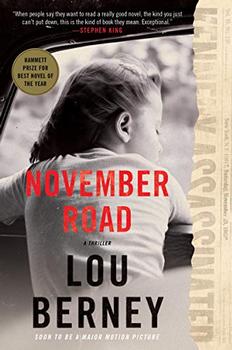Summary | Excerpt | Reviews | Beyond the book | Read-Alikes | Genres & Themes | Author Bio

Oh boy. Reader, prepare thyself. This is not your father's (or mother's for that matter) casual fireside read. This is a full-out assault on your sense of what a thriller is all about. Because Saul Black (British author Glen Duncan's pseudonym) is exploring the pain – in its many derivations – that humans inflict upon one another, and this book is a test of the gut.
Ostensibly it is about San Francisco Police Detective Valerie Hart and her hunt-turned-obsession for a pair of serial killers who are crisscrossing the western United States raping, torturing, sometimes eviscerating, and, ultimately, murdering women. But there are so many layers to the novel that it defies my ability to describe it in a single paragraph. It opens with the brutal and graphic rape/murder of a widowed Christmas cookie-baking rural Colorado mom and the execution-style murder of her teenaged son. While the killers are still in the house, ten-year-old Nell, who was playing outside while all of this was happening, innocently enters the grisly scene. Her ravaged mother orders her to "Run!"
At this point if the reader isn't jarred into an uber-heightened mental state of bedlam – witness twinkling Christmas lights and cinnamon-scented cookies juxtaposed against a hunting knife, a gun, a dead boy and the bloodied, half-naked young widow – it isn't Black's fault. He has put his considerable writer's skill to work: to move and appall and disgust and frighten and mesmerize. If this has not closed the book for you (which, I admit, it might) you will be impelled to turn page after page after page.
While Nell kneels next to her dying, pleading, bleeding mother, the inept dimwitted "beta" murderer, Paulie, comes down the stairs. The alarmed child runs for her life. A snowbound chase ensues, culminating when a bridge collapses and Nell all but drops into a ravine. Paulie, tired and with a bum knee, gives up the chase, goes back to the house and decides to keep the fact of the little witness a secret from Xander, his alpha partner:
Which Paulie knew was an insane decision to have made – but he'd made it. There were a lot of decisions he made this way, with the sense that the thing they were intended to avoid couldn't be avoided. He did this with a mix of lightness and terror and fascination. He lived a light, terrified, fascinated life slightly to one side of Xander. But the longer he hung around Xander, the smaller and less reliable that life became. So now in a kind of looped dream he told himself Xander mustn't know about the girl and Xander would find out and Xander mustn't know and it was only a matter of time before Xander found out and he wouldn't tell him.
It is with a mix of narrative voices like this that Black ensnares us. From Paulie's hazy non-logic to the guilt-ridden self-talk of Valerie Hart as she smokes and drinks too much, eats and sleeps too little, and drives away the only man who truly loves her:
At her apartment in the small hours, Valerie sat in front of her desktop going through the new San Francisco Zoo CCTV footage. Or rather, she sat with the footage running without being able to focus on any of it. She was halfway through a bottle of Smirnoff, and there were too many Marlboro butts in the ashtray. Someone had said to her a long time back: Once you've agreed to let them kill you, cigarettes will stick with you through thick and thin. Cigarettes will be there for you…Her eyes itched and her body ached.
There are more characters we get to know, such as the man who offers shelter to the hypothermic Nell at his cabin in the woods and the Oxford educated British ex-pat greasy spoon waitress who becomes Xander and Paulie's next victim. Black brings us into their heads so we can understand them. We may or may not like them. But, by golly, we understand what they are thinking. Black not only quotes poet W.H. Auden (and T.S. Eliot and Yeats and more) in this novel, he takes Auden's words quite literally when the poet says that a novelist "Must struggle out of his boyish gift and learn/How to be plain and awkward, how to be/One after whom none think it worth to turn."*
It's deep. It's complex. It's explicit. But, damn, it's well written. It had to be pure torture to assume the personalities of all these characters, to see and accept them in all their imperfections. But if you can stick with the overt and implied brutality of The Killing Lessons this is, indeed, one hell of a thriller.
*From *W.H. Auden's The Novelist (see Beyond the Book for more on this poem.)
![]() This review was originally published in The BookBrowse Review in October 2015, and has been updated for the
September 2016 edition.
Click here to go to this issue.
This review was originally published in The BookBrowse Review in October 2015, and has been updated for the
September 2016 edition.
Click here to go to this issue.

If you liked The Killing Lessons, try these:

by Lou Berney
Published 2019
Set against the assassination of JFK, a poignant and evocative crime novel that centers on a desperate cat-and-mouse chase across 1960s America - a story of unexpected connections, daring possibilities, and the hope of second chances.

by Chelsea Cain
Published 2015
A heart-stopping, entertaining thrill ride, One Kick announces the arrival of a blistering new series by a stunning talent in the thriller realm.
Your guide toexceptional books
BookBrowse seeks out and recommends the best in contemporary fiction and nonfiction—books that not only engage and entertain but also deepen our understanding of ourselves and the world around us.